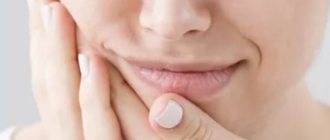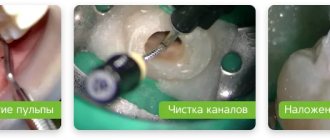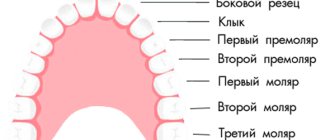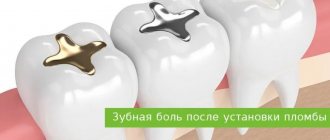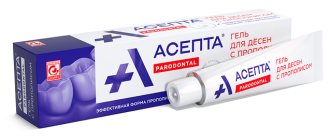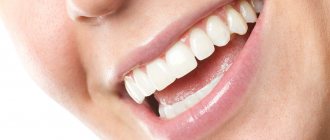The vast majority of the adult population of the planet is familiar with toothache. It can manifest itself in different ways, including when pressure is applied to a tooth, when a person cannot bite even soft food.
| Causes of pain and accompanying conditions | Methods for eliminating toothache |
| Increased sensitivity of the tooth in the absence of external damage, pain occurs even with slight pressure | At home: rinsing with herbal decoctions, soda solution When visiting a doctor: remineralization (treatment with preparations containing calcium and fluoride), in some cases - building up new enamel |
| Damage to enamel (cracks, chips - including microscopic ones invisible to the eye), the appearance of severe pain when exposed to any factor | It is recommended to consult a doctor |
| Inflammation of the gums: pain occurs when pressing on a healthy tooth precisely because of the condition of the gums | At home: rinse with a water-soda solution, sea buckthorn oil lotions. If there is no effect, you should consult a doctor. |
| Inflammation of the upper part of the tooth (periodontitis), accompanied by independent, precisely localized pain and a general deterioration of the condition | Treatment at home is impossible; you need to see a doctor. During the first week after removal: rinse |
| Removal of the nerve: after depulpation, pain may persist due to injury to the fibers (the reason is unskilled intervention that led to tissue necrosis due to insufficient asepsis of the canals) | The persistence (especially the intensification) of pain requires immediate contact with a doctor in case of a medical error |
| A complication of caries is pulpitis, intense pain that intensifies when chewing, discoloration of tooth enamel (graying) | requires immediate medical attention; if delayed, tooth loss may occur |
Pain when pressing on a tooth after treatment
Pain when pressing on a treated tooth is an absolute norm: any dental intervention has a traumatic effect on the gum tissue, recovery takes some time, but every day the pain weakens.
In patients with increased tooth sensitivity or a low pain threshold, the recovery process may take 1-2 months.
To alleviate the condition during this period, it is recommended:
- Thorough brushing of teeth using dental floss;
- rinsing (starting from the fourth day after treatment);
- use of painkillers.
Causes
The circulatory system and… are responsible for such a specific manifestation of pain. gravity. When you lie on your side, blood flows under the influence of gravity to the lower part of the body (lower - in relation to the surface on which you are lying).
This causes the tissues of the lower body to become compressed by the blood flow. In good health, you will not even notice this “gravitational effect”, since it is compensated by intracellular pressure. But when inflammation develops in the tissues, they swell on their own. And the nerve fibers located in such a pathological focus are pinched and begin to signal pain. When pressure on the nerves increases due to blood flow, the signal correspondingly becomes even stronger.
The mechanism of pain, which appears only in a lying position (or sharply intensifies in a horizontal position) is the same for all inflammatory processes - it does not matter whether the ligaments are inflamed after an injury or the nasal mucosa during a runny nose.
But when such pain appears in a tooth, the causes may be the following diseases:
- acute or chronic pulpitis (inflammation of the pulp);
- periodontitis (inflammation of the supporting apparatus of the tooth);
- periodontitis (inflammation of the tissues surrounding the tooth root and root membrane);
- periodontal abscess (purulent formation at the root of a tooth);
- periostitis (inflammation of the periosteum of the jaw);
- tooth root cyst.
All of these diseases have one thing in common. They are accompanied or caused by inflammation of the tooth tissue or tissues surrounding the tooth, and the rush of blood to these areas leads to increased pain.
Why complications arise
Deformation of tissues (even minimal chips of enamel) causes various complications, which is associated with the penetration of infections into the depths of the tooth. Among the most serious complications:
- abscess (can spread to several teeth or cover half the jaw);
- sinusitis, pharyngitis, sepsis;
- inflammation of the jaw bone;
- development of phlegmon (with damage to the facial muscles).
All these infections are fraught with penetration into the blood and disruption of the general condition of the body.
The most common complication is the development of caries, which, in the absence of adequate treatment, leads to complete destruction of the tooth with the need for its removal.
Why can teeth hurt?
Toothache can have a variety of causes, including hot and cold foods or drinks. Another - although not the most common - factor that can cause tooth pain is a cold or sinus infection. Increased pressure in the sinuses can cause discomfort in the area of the teeth, since the roots of the latter are located close to the sinuses. One way or another, it is important to find out whether this discomfort has more serious causes that require medical intervention.
How to find out why your teeth hurt
If you have symptoms of a cold, flu, or sinus infection, especially nasal congestion and sinus pressure, then it's likely that toothache is related to this. The frontal sinuses are located close enough to the roots of the teeth and their nerves that pressure and pain in the sinuses can be transmitted to the structures of the oral cavity. As otolaryngologists explain, pain in the teeth of the upper jaw is a common symptom of sinusitis. Talk to your doctor about treatment for sinusitis or other respiratory illness that may cause nasal congestion. On the Medportal information website you will find a detailed description of many respiratory diseases and their symptoms, including a runny nose, sore throat and frequent dry cough.
Often with colds and flu, there is stuffiness in the ears, obstruction of the Eustachian tubes, and otitis media develops. Pressure in the ear can cause discomfort in the chewing teeth and roof of the mouth. If your ear and teeth on the same side of your head hurt at the same time, the cause of the toothache may be irradiation of pain from the ear, explain experts from the St. Petersburg State Medical University named after Academician I. P. Pavlov. In the absence of an ear infection, ear congestion is treated in the same way as sinus or nasal congestion. If your ears hurt and feel as if they are full of fluid, you feel pressure on your eardrums and hear frequent clicking sounds, consult a doctor to rule out inflammation of the middle ear, which may require antibiotics to treat.
If your teeth hurt, but there are no symptoms of a common cold, and you don’t know what the cause of the pain is, then the best thing to do is to visit a therapist or dentist for an accurate diagnosis. Some conditions that provoke toothache are fraught with serious consequences and require immediate medical intervention. Direct or indirect causes of toothache can, of course, be dental diseases and conditions such as periodontitis, caries, enamel erosion, loss of hard dental tissues and involuntary grinding of teeth during sleep (bruxism).
How to relieve toothache caused by a cold
If your toothache is caused by nasal congestion caused by a cold, flu, or sinusitis, try reducing the pressure in your sinuses. To do this, you can use over-the-counter vasoconstrictors and mucus thinners. Rinsing the mouth with a decoction or tincture of sage, chamomile and other medicinal herbs can also relieve toothache. You can also resort to over-the-counter pain relievers. In addition, the following can help reduce toothache:
- Rest and long sleep
- Warm drinks and soups
- Cold medicines that thin the mucus that causes nasal congestion
- Cough drops or tea with honey to relieve throat irritation caused by sinus discharge
As additional means for use at home, specialists from the Scientific Research Clinical Institute of Otorhinolaryngology named after L. I. Sverzhevsky recommend using a humidifier and rinsing the nose. If you experience pain in your sinuses or a feeling of strong pressure in them when you tilt your head in different directions, you should definitely consult a doctor, especially if the pain does not go away for a long time and/or is accompanied by an increase in temperature - this may be a sign of a serious sinus infection, or sinusitis.
Teeth can also hurt due to increased sensitivity. If pressure and contact with cold or hot foods and drinks cause acute, short-term pain in your teeth, a special toothpaste for sensitive teeth can help. If your toothache is not related to a cold or sinus infection, be sure to consult with your dentist, who can make the correct diagnosis and recommend appropriate treatment.
How to cope with pain?
Toothache is always a good reason to see a doctor; it’s worth taking the time to avoid complications!
If professional dental care is not possible, first aid is to relieve pain and minimize inflammation.
Analgesics of various effects used in dentistry - tempalgin, ketorol, nurofen; standard dosage regimen - 1-2 tablets every 4 hours; The effect of the drugs begins within the first 15 minutes and lasts up to 6 hours.
Tartar
This disease manifests itself if oral hygiene is not observed. Due to improper removal of dental plaque or neglect of brushing the teeth, the plaque hardens and a brown plaque appears, which becomes impossible to get rid of on your own. To prevent tartar from appearing, you should perform thorough oral hygiene twice a day (morning and evening). Signs of stone formation include:
- Having bad breath;
- Itching and bleeding gums;
- There are dark spots on the enamel surface, which are very difficult to get rid of with a regular brush and paste.
The insidiousness of the stone is that it forms in the mouth on dentures, crowns, and not just on natural enamel. Of course, stone on crowns will not lead to caries, but it will contribute to the development of infections on the gums.
They turn to a doctor when it is problematic to remove tartar on their own. The dentist does the following:
- Using a hand tool or ultrasound, plaque and stone are removed;
- The surface of the teeth is polished;
- Surfaces are polished using ultrasonic tools and pastes with abrasive particles of varying degrees of dispersion.
Tartar is removed under local anesthesia - treatment with ice-caine spray is sufficient.
Rinse for painful sensations
Rinses are also widely used - both homemade and pharmacy. For example:
- 100 ml of water, a teaspoon of soda, a teaspoon of soda, iodine - 5 drops. Used to relieve swelling and remove purulent contents
- 1 spoon of sage per glass of boiling water (decoction), anise - 10 drops. Provides pain relief and has an anti-inflammatory effect.
- 1 glass of warm water, 1 tablet of furacillin. Powerful antibacterial effect, reducing swelling.
The drug chlorhexidine has a good aseptic effect; so-called dental elixirs can be used to relieve pain.
It is important to understand that all the methods listed above are only first aid for toothache; if you stop there, you will soon inevitably need tooth extraction!
To eliminate pain, it is necessary to identify and eliminate the cause of the problem. This can only be done in a dental clinic, where modern equipment ensures comfortable and painless treatment.
Methods for treating and relieving tooth pain when tapping
If pain occurs when you tap on a tooth, you should immediately seek help from a specialist. If you have pain of this nature, you cannot try to do anything with the tooth on your own, in this way you can aggravate the situation even more, since the cause of the pain can lie deep and be associated not only with the tooth. However, if the pain is very severe and does not allow you to calmly wait for a visit to the dentist, there are several effective ways to relieve pain.
Ways to relieve toothache when tapping:
- rinse the mouth with soda solution, furatsilin solution, as well as herbal tinctures of chamomile or calendula (this method helps to stop the development of inflammatory processes and reduces pain)
- take a painkiller (this method will relieve tooth pain for a while).
The occurrence of pain when tapping on a tooth is a direct indication for a visit to the dentist. Under no circumstances should you delay going to the doctor, as failure to treat this problem in a timely manner can lead to serious problems and possibly even the need for surgical intervention. Remember, teeth are very important; care and treatment should not be neglected, since a problem with one tooth can lead to the destruction of the entire dentition.
Treatment: when the cause of the pain is established
Having established the cause of the pain, the dentist will prescribe appropriate treatment.
The approach to treatment depends not only on the established cause of pain, but also on the neglect of the process (the degree of damage to the tooth and adjacent tissues).
- If increased tooth sensitivity is detected, remineralization or fluoridation is performed.
- The presence of chips and cracks requires composite enamel extension, or, as an option, the installation of veneers or crowns.
- In inflammatory processes, a course of treatment with antibiotics is usually prescribed with the installation of a filling after the source of inflammation has been eliminated.
- If the cause of pain lies in a poorly placed filling, it is polished or replaced with a new one.
- Detection of caries and pulpitis requires dental intervention such as preparation of the upper part of the tooth and opening of the cavity with the placement of medicine. After eliminating the infection, the dental canals are filled and the relief of the dentition is restored.
- Treatment of periodontitis is more complex; a specialist in such diseases is a dental surgeon. Drainage of the purulent cavity is performed, after the capsule is emptied of purulent contents, the canals are cleaned and the tooth is treated; in case of extensive lesions, resection of the root apex of the tooth is required.
Pain in a tooth when tapping on it, causes and treatment
Any person has experienced pain in a tooth at least once in their life. Often, even people who have no dental problems suddenly begin to experience tooth pain. Toothache can appear when biting, chewing, tapping, or even just touching a tooth; often such pain can radiate to different parts of the head and ear.
There are a large number of different causes of pain in a tooth when tapping. Often the pain can be dangerous and hide serious inflammations and diseases. In some cases, pain appears suddenly and is short-lived, and sometimes it is long-lasting and with significant bleeding of the gums. In any case, it is very important to track the nature of the pain and identify the real cause of its occurrence in order to prevent the development of unpleasant consequences.
Causes of toothache when tapping on a tooth:
- carious lesion;
- periodontitis;
- presence of cracks and injuries in the tooth;
- inflammation of the gum or tooth root;
- a recently filled tooth (such pain usually goes away within a few days), etc.
If you have a toothache of this nature, you should definitely seek help from a dentist. If the diagnosis is not made in a timely manner and without the correct treatment prescribed, complications may develop against the background of the underlying cause of the pain, requiring more serious methods of elimination.
Complications
The most obvious complication of such pain is a severe decrease in a person's quality of life. Complaints that “The tooth only hurts when I lie down” can also be translated as “I can’t sleep.”
Without proper rest, sooner or later the body’s nervous resources are depleted, and pain is accompanied by neuropathic disorders, sudden mood swings, irritability or apathy and other disorders that in one way or another affect a person’s life and his relationships with others.
But the dental range of complications is no less impressive. These include the development of a purulent process and the release of infection into the bloodstream; spread of inflammation to the soft tissues of the face, lymph nodes and much more.
Toothache
Why do my teeth hurt?
With the help of pain, our body signals about some problem. When you see a dentist, you need to describe your sensations as accurately as possible, since diseases are initially determined precisely by the nature of the pain.
So, let's start with the simplest thing. You have noticed that your teeth react painfully to cold, hot, sour, brushing your teeth, and also when you go outside and breathe in cold air. Most likely, the structure of the enamel is damaged. Such pain occurs for only a few seconds and quickly disappears.
The reason for its appearance may be:
- cracks, chips and abrasions
- thinning of enamel
- increased enamel sensitivity
The situation can be corrected using a special procedure - remineralization. It will help restore the structure of the enamel by saturating it with useful substances. It is also worth replacing your usual toothpaste with a special one with a high content of calcium or fluoride. Consult your dentist and he will tell you how best to proceed.
What else causes toothache?
Sometimes a tooth hurts due to diseases of neighboring organs. Painful sensations appear in the following cases:
- inflammation of the ear, nose and throat
- damage to the temporomandibular joint
- cervical spine injuries
In fact, the pain simply “radiates” into the tooth, but due to the high sensitivity of the soft tissues, it seems that it comes precisely from the root of the tooth or gum.
There are situations when a patient comes to the dentist and complains about a completely healthy tooth - this is already psychosomatics. Unpleasant sensations can appear due to severe stress, lack of sleep, or overload.
Pain due to dental diseases
In the vast majority of cases, the tooth is bothered due to caries, its complications and some other diseases. The nature of the ailment depends on which tooth is bothering you: the upper, lower or wisdom tooth.
Toothache can be:
- acute
- constant
- paroxysmal
- pulsating
As we have already said, the nature of the pain indicates a particular disease. If you feel a sharp, sharp “tingling” in your tooth while eating, but the unpleasant sensation disappears as soon as you remove the irritant, then this indicates caries. When the pain intensifies in the evening, and you are tormented by attacks all night, then this is a sure sign of inflammation of the nerve of the tooth.
Unbearable, throbbing toothache, deterioration in general condition, elevated temperature, swelling of the gums near the disturbing tooth indicate periodontitis. This disease requires immediate examination by a specialist.
When discomfort is accompanied by swelling of the gums or cheeks, serious inflammation of the gums (periodontitis) is possible. In such a situation, you need to immediately make an appointment with the dentist, since periodontitis leads to tooth loss.
What to do if you have a toothache?
You were calmly going about your business, but suddenly you were struck by severe pain and you absolutely don’t know how to get rid of it. If a tooth “aches” while brushing or eating, immediately remove the irritant and rinse your mouth with water. Pay special attention to the troubled tooth, as you need to get rid of any leftover food and toothpaste.
How to act in case of severe toothache?
- remember the approximate time during which the tooth calmed down
- see if there is damage to the tooth, swelling of the gums or cheeks
- make an appointment with the dentist soon
If your child has a toothache, then you need to act carefully and quickly make an appointment with a dentist, since only he will be able to correctly determine the cause of the pain and eliminate it. You can ease your baby's suffering by applying a cold compress to the cheek on the side of the sore tooth.
Can a tooth hurt after treatment?
You visited the dentist, underwent treatment, but when you came home, the tooth hurt again. Do not panic; discomfort after treatment may last from 1 to 3 days.
Your tooth may hurt after:
- root canal treatment and filling
- nerve removal
In both cases, you did not undergo the most simple operations, so pain is a completely natural reaction of the tissues to the intervention. The main criterion in this case is that the strength of the pain decreases: it hurt a lot, then less, and sometimes you didn’t notice how it went away. If the pain does not subside, but increases, this is a reason to return to the clinic.
Pain after tooth extraction is also quite normal. Is your cheek swollen or your gums swollen? There is nothing wrong with this, since even with the most careful extraction of the root, the surrounding tissues are damaged, albeit slightly. The discomfort will gradually disappear as the hole heals.
How to get rid of toothache at home?
An aching tooth will prevent you from going about your business in peace. What to do in this situation, especially if it is not possible to visit a dentist in the near future?
The easiest way out is to take pills. Any painkiller that is not too strong will do; take it according to the instructions on the package.
Anesthetics relieve only the symptoms of the disease, and only for a while. Do not get carried away with painkillers, as they weaken the effect of anesthesia, which may be needed during treatment in the clinic.
Traditional methods will also help you get rid of toothache at home. The surest way to calm a tooth is rinsing.
For this you can use:
- a solution of soda with a few drops of iodine
- saline solution (it is better to use sea salt)
- decoctions of sage, chamomile, yarrow, mint, lemon balm, St. John's wort
- alcoholic drinks and tinctures diluted with water
Pressing on certain points can help relieve toothache. This method will also help out when you do not have the opportunity to take medicine or prepare a healing infusion. You need to press on the acupuncture points; according to all the rules of this ancient Chinese movement, needles are placed in special places, but you won’t need them.
Clench your teeth tightly and use your thumbs to massage the raised bumps. You can also rub the area between the thumb and index finger, the point between the upper lip and nose.
Traditional methods will relieve toothache only for a short period of time, so visit the dentist as soon as possible.
When should you see a dentist?
To ensure that your teeth are always healthy and the likelihood of sudden pain is as low as possible, you should regularly visit the dentist for a preventive examination. In addition, you need to undergo professional oral hygiene twice a year to remove soft and hard plaque, since it is this that causes caries and other diseases.
If you experience acute toothache, try to visit the dentist as quickly as possible, preferably on the same day. This will help you avoid unnecessary worries, costs and start treatment in a timely manner.
Still have questions? Ask them to us
Severe toothache does not give you time to think and search for a specialist, but even in such a situation you want to get to a competent specialist, so that later you do not have to treat the tooth due to caries under the filling or improperly closed canals. At the MediLine clinic, we are always ready to provide you with emergency dental care and restore your healthy smile.
If you have any questions, write to us. We will definitely respond to you within one day.
Zabirova Gulia Rafikovna
Dentist-therapist
Work experience: 17 years
Home treatment
Even with the most severe toothache, it is not always possible to quickly consult a doctor. But enduring pain also makes no sense - the longer you endure it, the stronger the pathological circle becomes, in which pain causes neurotic disorders, and they, in turn, lead to increased pain.
Therefore, if your tooth hurts while lying down, adopt the following methods to help you survive the few days before you visit the doctor:
- Try to lie on the other side, and if for some reason this is impossible for you, place another pillow under your head. This will slow down blood flow to the inflamed area.
- Before going to bed, steam your feet and put on warm socks. This will "divert" the blood to your legs and give you time to fall asleep. People with hypertension and varicose veins should use this method with caution.
- Painkillers (Bral, Analgin, Tempalgin, Ibuprofen, Nimesil, Nise, etc.) will help relieve pain. But you should take the chosen remedy 30-40 minutes before you are going to bed. By the time you take a lying position, the drug will already take effect and the pain will not bother you.
Category Miscellaneous Published by Mister dentist
